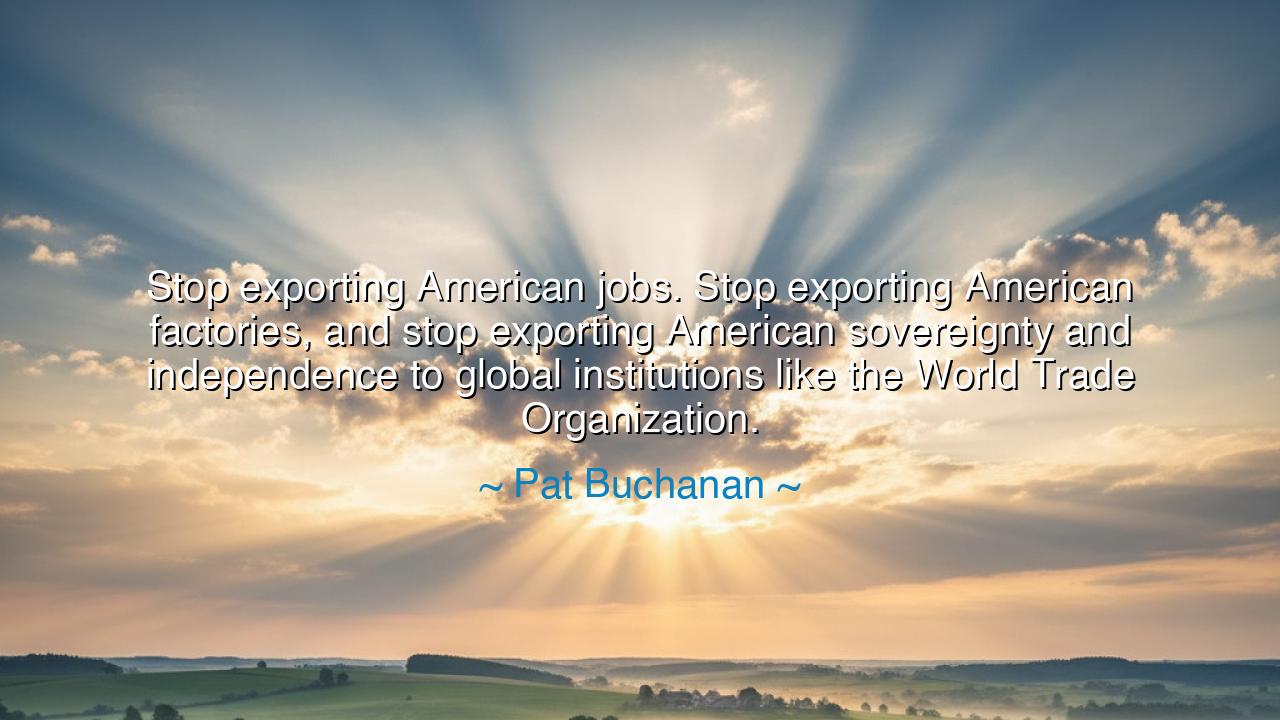
Stop exporting American jobs. Stop exporting American factories
Stop exporting American jobs. Stop exporting American factories, and stop exporting American sovereignty and independence to global institutions like the World Trade Organization.






The words of Pat Buchanan thunder with the voice of an old sentinel guarding the gates of a nation. When he declared, “Stop exporting American jobs. Stop exporting American factories, and stop exporting American sovereignty and independence to global institutions like the World Trade Organization,” he was not merely protesting trade policy—he was sounding an alarm for the soul of a civilization. His cry was not against the world itself, but against the slow and silent surrender of what makes a people self-reliant and free. In his voice one can hear the echo of generations who labored, built, and fought so that their children might inherit a land not ruled by distant powers or faceless councils, but by the hands and hearts of its own people.
To understand this quote, we must return to the late 20th century, when the fires of globalization began to sweep across the earth. Factories that once roared in the heartlands of America fell silent as production moved overseas. Entire towns—steel towns, mill towns, auto towns—became ghosts of their former selves. Men who had built ships, machines, and engines of progress found themselves without work, without purpose, watching as the wealth they had created was shipped away. Pat Buchanan, a political thinker and fierce nationalist, spoke during this time not as an economist, but as a watchman warning that a nation that trades away its industry also trades away its strength.
For Buchanan, sovereignty was more than a political term—it was a sacred covenant between a people and their destiny. He saw in the rise of organizations like the World Trade Organization (WTO) the seeds of dependency and decline, for whenever a nation yields its decision-making to unelected powers abroad, it forfeits a part of its independence. His warning was simple and ancient: that no empire, however mighty, can remain strong when it no longer produces the goods it consumes or controls the rules by which it lives. Once you surrender your factories, you surrender your future; once you surrender your sovereignty, you surrender your freedom.
History offers a mirror to this truth. Consider the decline of Great Britain after the Second World War. Once the forge of the Industrial Revolution, her factories powered the world, and her navy ruled the seas. Yet when her industries began to fade, when production was sent elsewhere, her global might dwindled. Economic dependence followed political decline, and the empire that had circled the earth receded into memory. Buchanan saw in America the same path unfolding—a proud nation forgetting that its independence rests not only upon ideals and armies but upon the labor of its own people, the mastery of its own production, and the control of its own destiny.
In the style of the ancients, let it be said: a nation that forgets how to make things forgets how to stand. The strength of a republic lies not in the wealth of its markets but in the virtue of its workers, the hands that craft, the minds that design, the pride that builds. To export the lifeblood of that labor is to hollow out the heart of a people. For when a nation’s factories fall silent, its spirit grows faint. When its sovereignty is bound to the will of others, its independence becomes a memory recited, not a reality lived. Buchanan’s cry, therefore, is not isolationist but protective—a call to remember that freedom must be guarded not only by soldiers, but by citizens who produce, create, and decide their own fate.
And yet, Buchanan’s warning transcends borders and eras—it speaks to every generation tempted to trade self-reliance for comfort, control for convenience, dignity for cheap abundance. He reminds us that wealth without work, prosperity without production, and growth without roots are illusions. Just as a man who depends entirely upon others for his livelihood loses his autonomy, so too does a nation that abandons its industries lose the power to shape its future. Independence—whether personal or national—is not a gift that endures without discipline; it is a fire that must be fed with effort, sacrifice, and vigilance.
Thus, let the lesson be written plainly: do not surrender what you can do for yourself to the hands of others. Whether as a nation or as an individual, protect your independence as you would your life. Build, create, and provide from your own strength. Seek cooperation with the world, but never servitude to it. A people who forget how to sustain themselves will one day awaken to find that they no longer rule themselves.
The practical path is this: value work that is real, defend sovereignty that is sacred, and remember that freedom is not sustained by promises or treaties, but by the will to stand alone if necessary. As Buchanan warned, the nation that exports its lifeblood for profit will one day import its chains for survival. Therefore, keep faith with the land that bore you, the people who built it, and the independence that defines it—for these are treasures no trade agreement can replace.






AAdministratorAdministrator
Welcome, honored guests. Please leave a comment, we will respond soon